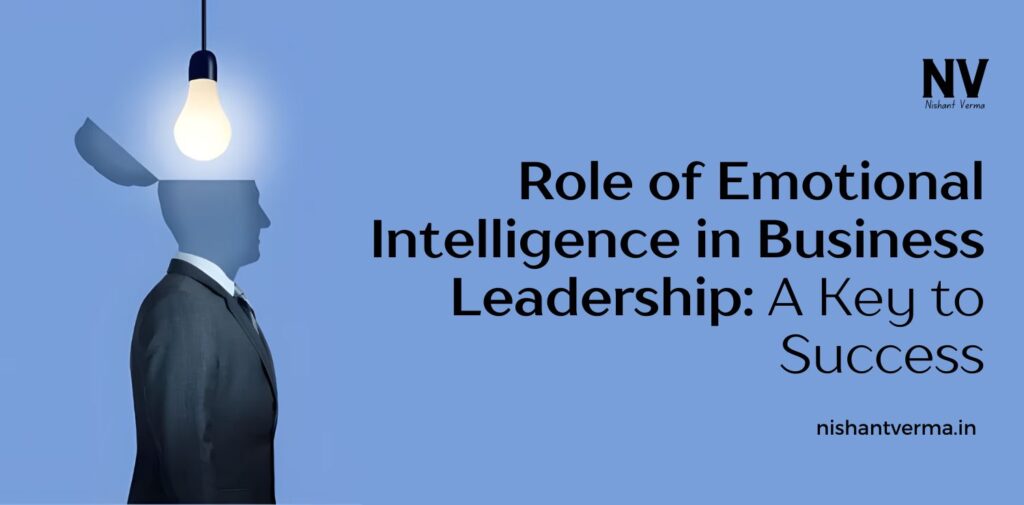In the dynamic business environment of India, effective leadership is not only about making tough decisions and driving results. It is also about understanding people, managing emotions, and building strong relationships. This is where emotional intelligence (EI) plays a pivotal role. Emotional intelligence refers to the ability to recognize, understand, manage, and influence emotions in yourself and others. For business leaders, mastering emotional intelligence can be the key to inspiring teams, handling pressure, and creating a productive work environment. In this article, we will explore the importance of emotional intelligence in business leadership and how it can contribute to your success as a leader in India.

1. Understanding Emotional Intelligence and Its Components
Emotional intelligence is made up of several key components. To be effective in business leadership, it is crucial to understand and develop these aspects of EI.
Self-awareness: This is the ability to recognize and understand your emotions and how they affect your behavior and decisions. A leader with high self-awareness is in tune with their strengths and weaknesses and can act with confidence and humility.
Self-regulation: Self-regulation involves managing your emotions in healthy ways. Leaders with strong self-regulation can stay calm under pressure, think clearly during stressful situations, and avoid impulsive reactions.
Motivation: Emotionally intelligent leaders are driven by a passion for achieving goals and inspiring others to do the same. They remain optimistic and resilient, even in challenging circumstances, which encourages their teams to stay motivated as well.
Empathy: Empathy is the ability to understand and share the feelings of others. Leaders who show empathy are able to build trust, strengthen relationships, and create a supportive work environment. In India, where cultural sensitivity is important, empathy is especially valuable in understanding diverse perspectives.
Social skills: Social skills refer to the ability to manage relationships, communicate effectively, and influence others in a positive way. Leaders with strong social skills can resolve conflicts, build teams, and navigate social dynamics within the workplace.
2. The Importance of Emotional Intelligence in Leadership
In India, where businesses often operate in complex and diverse environments, emotional intelligence is becoming an essential trait for successful leadership. Indian workplaces often involve people from different cultural backgrounds, language barriers, and varied socioeconomic contexts. Understanding these nuances and managing interpersonal relationships is key to achieving organizational goals.
A leader with emotional intelligence can adapt their communication style, provide constructive feedback, and support their team in difficult times. Emotional intelligence also helps leaders avoid conflicts, foster collaboration, and create a positive organizational culture, all of which are crucial for long-term success.
In the fast-paced and competitive Indian market, business leaders who possess emotional intelligence can remain calm during times of uncertainty, make better decisions, and motivate their teams to perform their best, even when facing challenges.

3. Building Strong Relationships with Employees
One of the core elements of emotional intelligence is empathy, and in business leadership, this can be a game-changer. Understanding your employees’ emotions, perspectives, and challenges can lead to stronger relationships and improved trust.
In India, where family-oriented values often extend into the workplace, leaders who show empathy and genuinely care about their employees’ well-being can create a strong bond with their teams. This bond fosters loyalty and commitment, which leads to higher employee satisfaction, productivity, and retention.
Empathy also allows leaders to communicate more effectively. When a leader understands the emotional state of their employees, they can tailor their messages and feedback accordingly. For example, during stressful times, offering words of encouragement or providing additional support can go a long way in boosting morale.
Moreover, empathy enables leaders to resolve conflicts more effectively. By acknowledging the emotions of both parties involved and helping them find common ground, leaders can turn potential conflicts into opportunities for growth and collaboration.
4. Improving Decision-Making Under Pressure
Business leaders often face high-pressure situations, whether it’s dealing with tight deadlines, managing a crisis, or navigating economic challenges. In such moments, emotional intelligence plays a crucial role in making sound decisions.
Leaders with high emotional intelligence are able to control their emotions and stay calm in stressful situations. This helps them think clearly, assess the situation objectively, and make decisions based on facts rather than emotions. In contrast, leaders who lack emotional intelligence may react impulsively, which can lead to poor decisions and negative consequences for the business.
In India, where businesses are constantly adapting to changing regulations, market conditions, and consumer preferences, leaders who possess emotional intelligence can make timely and well-informed decisions that drive the business forward. Their ability to stay calm under pressure also sets a positive example for their teams, encouraging them to remain focused and perform at their best.
5. Enhancing Team Collaboration and Motivation
A leader’s emotional intelligence directly impacts the performance and motivation of their team. When leaders are emotionally intelligent, they create a work environment where collaboration is encouraged, and employees feel supported.
In the Indian business landscape, where teamwork and collaboration are vital for success, emotionally intelligent leaders can foster a sense of unity among team members. They can identify the strengths and weaknesses of each individual and assign tasks accordingly, ensuring that the team works efficiently towards common goals.
Furthermore, emotionally intelligent leaders are skilled at motivating their teams. They recognize the emotions that drive their employees and can tailor their approach to suit individual needs. For instance, some employees may need encouragement and praise, while others may respond better to constructive feedback and guidance. By understanding these emotional triggers, leaders can inspire their teams to perform at their best and reach their full potential.

6. Creating a Positive Organizational Culture
Emotional intelligence is also crucial for creating and maintaining a positive organizational culture. A leader’s emotional intelligence sets the tone for the entire organization. When leaders model emotionally intelligent behavior, it influences the behavior of their employees and contributes to a healthy, productive work environment.
In India, where businesses are often family-oriented and relationship-driven, emotional intelligence can help create a culture of trust, respect, and cooperation. Leaders who show empathy, manage their emotions, and communicate effectively create an atmosphere where employees feel valued and motivated to contribute to the company’s success.
Moreover, emotional intelligence helps leaders navigate workplace challenges such as high turnover, employee dissatisfaction, and low morale. By addressing emotional issues and providing support, leaders can build a resilient workforce that can weather any storm and continue to thrive.
Conclusion
Emotional intelligence is an essential trait for effective business leadership, especially in India, where businesses operate in a diverse and fast-changing environment. Leaders who possess emotional intelligence can build strong relationships with their employees, make better decisions under pressure, motivate their teams, and create a positive organizational culture.
As the business world becomes increasingly complex, emotional intelligence will continue to play a critical role in determining the success of leaders and organizations. By understanding and developing the components of emotional intelligence, business leaders in India can create a work environment that fosters collaboration, productivity, and long-term success.
If you’re a business leader or aspiring to become one, developing emotional intelligence is one of the best investments you can make for yourself and your organization. It will not only help you lead more effectively but also build stronger, more cohesive teams that can navigate the challenges of the modern business landscape.




